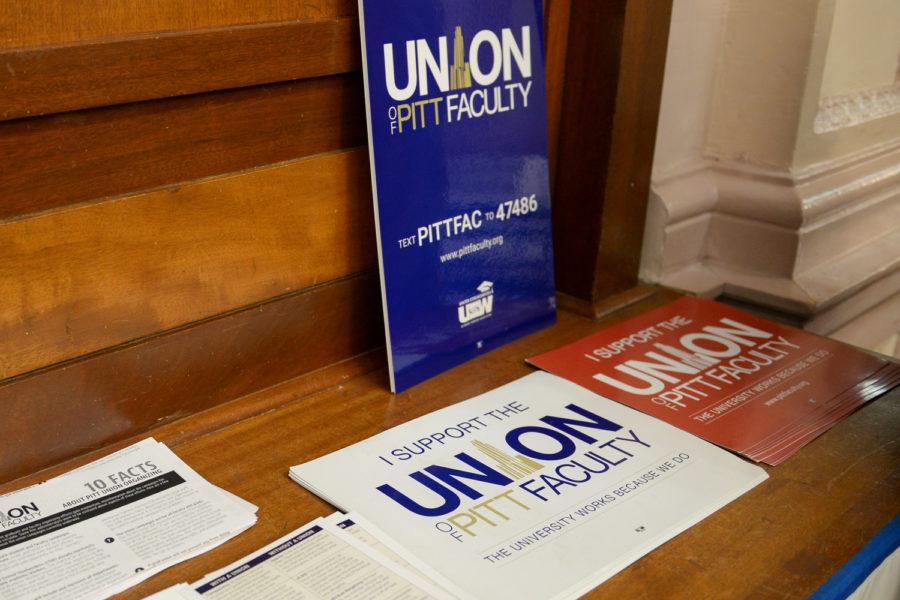Pitt’s spending on ‘union avoidance firm’ slows, but reaches $3M
Pitt Faculty Union flyers on a campus table.
January 18, 2023
Pitt reduced payments to “union avoidance” law firm Ballard Spahr following faculty unionization, but continues to pay hundreds of thousands to firms with labor management services as efforts to organize staff and graduate student unions persist.
According to Pitt’s financial disclosure reports, the Office of University Counsel paid Ballard Spahr $159,755 in fees between July 1, 2021 and June 30, 2022, bringing the University’s total payout since 2016 to more than $3 million.
Ballard Spahr’s labor attorneys help employers avoid unionization, prevent strikes and push for union decertification or withdrawal, according to their website. The firm did not respond to questions about whether it is providing Pitt with these services.
The University first hired the firm in 2009, and continues to work with it “on a number of matters,” according to a Pitt spokesperson.
Pitt declined to name the employee speaking on behalf of the University.
Under Pennsylvania’s Public School Code of 1949, Pitt and other state-related universities must submit financial disclosure reports — which list goods and service contracts that exceed $1,000 — to the state every year. The Stairs Report, as it is known, is typically made available to the public in January via the Department of Education.
Pitt’s Office of University Counsel reported $6,042,890 in expenditures during the 2022 fiscal year, a decrease of $732,873 since the last report.
The $159,755 payment to Ballard Spahr marks a substantial decline from the most active years of the faculty and graduate student union drives. Pitt paid Ballard Spahr $721,152 in fiscal year 2021, $881,069 in fiscal year 2020, $1,071,573 in fiscal year 2019 and $239,061 in the three fiscal years prior.
Before unionization efforts officially launched in 2016, Pitt’s payments to Ballard Spahr never exceeded $8,641 in a given fiscal year.
According to a spokesperson, the University draws from the general operating budget for these expenses, which includes student tuition.
“It’s imperative that the administration dedicate University resources toward improving our campus community instead of racking up attorneys’ fees,” said Melinda Ciccocioppo, chair of the faculty union’s communication and action team.
Pitt also paid $191,055 to Morgan Lewis & Bockius, a firm that has recently helped Amazon, McDonald’s and other large corporations resist workers’ efforts to organize. Financial disclosures alone are not indicative of anti-union spending, and the University declined to say whether this firm was paid for union avoidance consulting.
“The University regularly works with outside counsel to expand capacity and leverage specific areas of expertise, including intellectual property, contracts and international trade,” a University spokesperson said.
The financial disclosures also reveal that Pitt paid $330,160 to Ogletree, Deakins, Nash, Smoak & Stewart. The firm serves as legal counsel to administrators in contract talks with the faculty union, a University spokesperson said.
Ogletree Deakins did not respond to requests for comment about its role in the collective bargaining process.
The union’s bargaining team most recently sat down with administration on Jan. 12, and released an online update the next day indicating progress on job security and academic freedom proposals. Job security, and particularly an automatic contract renewal process for non-tenure-stream faculty, was a focus of multiple union demonstrations last year.
Dozens of union faculty members protested outside of Provost Ann Cudd’s office in December to push for a counterproposal on job security, and another 150 gathered in Posvar Hall for a similar demonstration in October.
In addition to limiting the University’s legal spending, Ciccocioppo urged administration to continue bargaining productively.
“Pitt faculty have been bargaining for nearly a year, seeking a fair contract that reflects our hard work and dedication as teachers, researchers, librarians and clinical supervisors,” Ciccocioppo said. “We remain committed to working with the administration to reach an agreement as quickly as possible — and call on it to do the same.”








